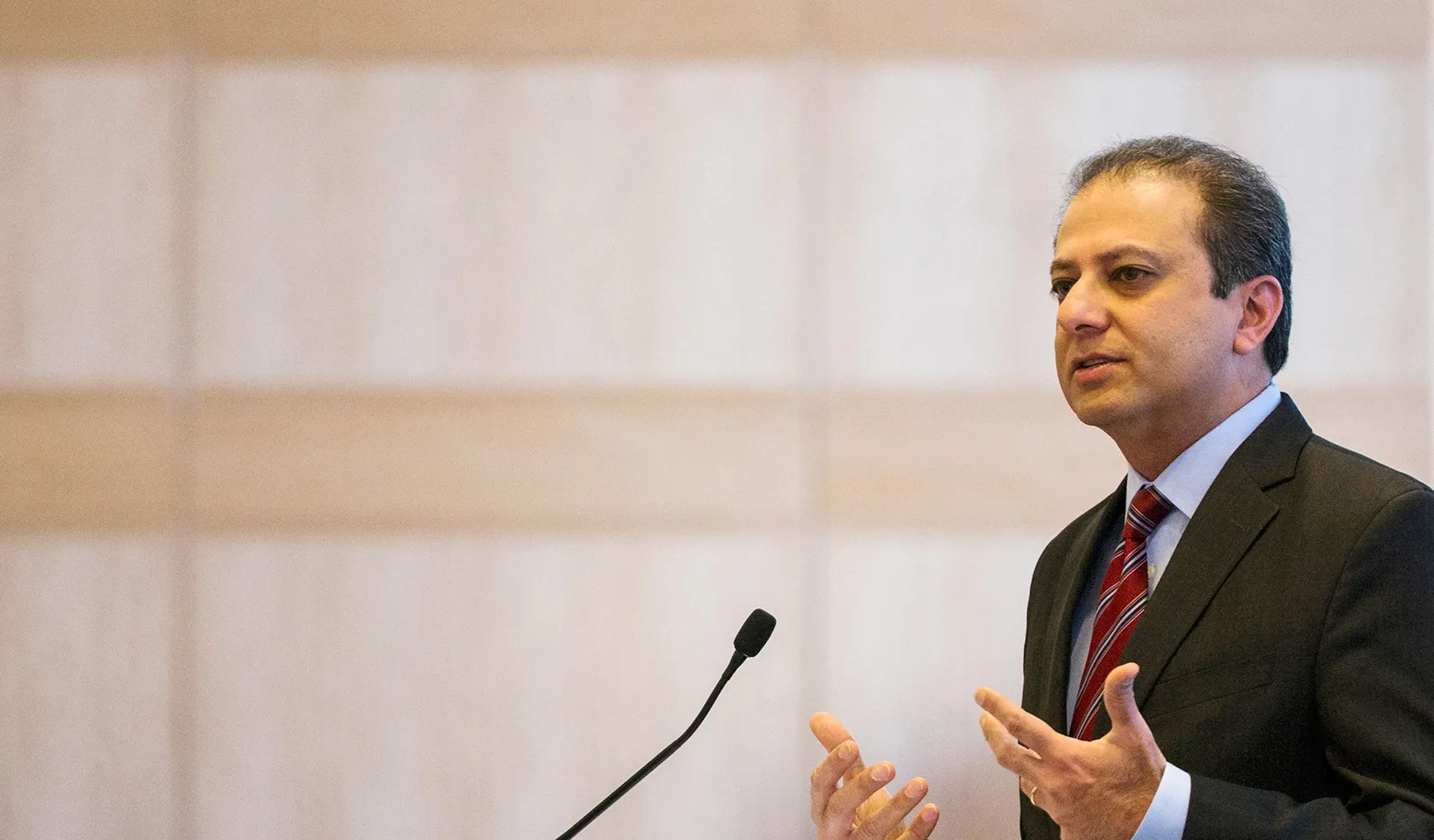April 17, 2015
| by Lily B. ClausenAs a federal prosecutor who has pursued some of the most infamous Wall Street criminals, Preet Bharara has seen plenty of businesspeople lose their moral direction.
When white-collar corruption occurs, the U.S. Attorney for the Southern District of New York says otherwise good people often stand by and do nothing.
“For years, there were good people, or reasonably good people, who knew at Galleon that something was fishy, who knew at Madoff Securities that something was fishy,” Bharara says. He prosecuted the cases involving insider trading at the Galleon Group and the fraudulent Ponzi scheme that landed Bernard Madoff in prison. “The great tragedy and regret you have is those people didn’t do anything about it.”
At a talk sponsored by the Stanford Graduate School of Business Politics and Government Club, Bharara offered advice to Stanford GSB students about following their moral compass.
Check Your Gut
“If you think something fishy is going on, you’re probably right,” Bharara says. Not sure it’s a wrongdoing? Bharara urges you to consider the principles of good behavior you learned as a child.
While it may be difficult to call out your boss or a co-worker, turning away is not the answer, either. “I’m not saying that in the first moment there’s a whiff of something bad going on, you immediately go on 60 Minutes,” he says. “You do something and you elevate it somehow, because chances are other people think [that], too,” he says.
A Firm’s Culture Matters
A culture of silence can hurt a firm. It breeds an environment where bad things happen but people don’t feel comfortable speaking up. “You want to create a culture in which people are going to come and tell you, ‘I have a little bit of a concern that we have this unit that’s playing fast and loose,’ ” Bharara says.
He urges leaders to create organizational cultures where people bring forward concerns and know that something will actually be done as a result.
Take a Critical Look
When deciding where to work, Bharara encourages applicants to consider a company’s reputation for ethics and integrity.
“You should think about what the reputation for honesty is, not only because it’s better to work in a place with a good reputation, but also because you’re taking less long-term risk with your current employment,” he says.
Interviews Are a Two-Way Street
When applying for a job, use the interview process to ask questions even if you think you know the answers. If you inquire about how your prospective manager thinks about ethics, integrity, or reputation, you’ll learn about how he or she would behave as a leader.
On the flip side, when hiring someone, pose hypothetical questions: “Suppose six months after joining a firm, you believe the person sitting two doors down is illegally trading on insider information. What would you do?” There’s no perfect answer to the question, but it can serve as an ethics litmus test, he says.
Bake Ethics Into Decisions
Honesty leads to financial rewards in the long run because it builds your reputation for integrity. Don’t separate issues of ethics from issues of business, Bharara says. Instead of saying, “we’ve got to talk about ethics now,” try baking ethics into all your business decisions.
“If you act with integrity, and you take risks — not because you’re trying to gain anything, but because it’s the right thing to do — people will generally recognize that,” Bharara says. “I think that’s true in government, and I think that’s true in business.”
Conduct an Ethics Fire Drill
Bharara encourages young business leaders to discuss hypothetical scenarios and how they would respond. Just like musicians rehearse and athletes practice, Bharara says people in business need to train by talking through with others how they would deal with a corrupt situation.
“(Making the ethical choice) requires thinking in advance [and] strategizing about it in advance, and it requires hearing from other people you trust and respect,” Bharara says.
For media inquiries, visit the Newsroom.






